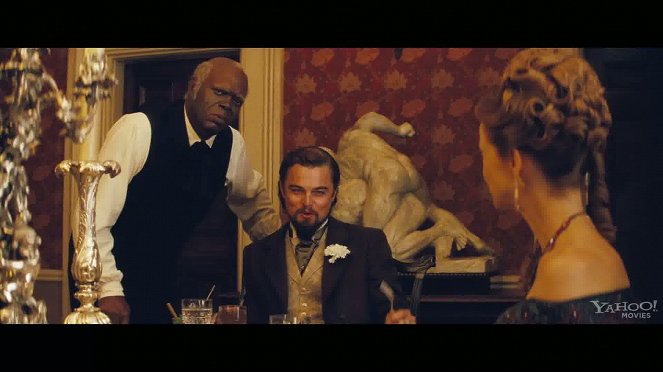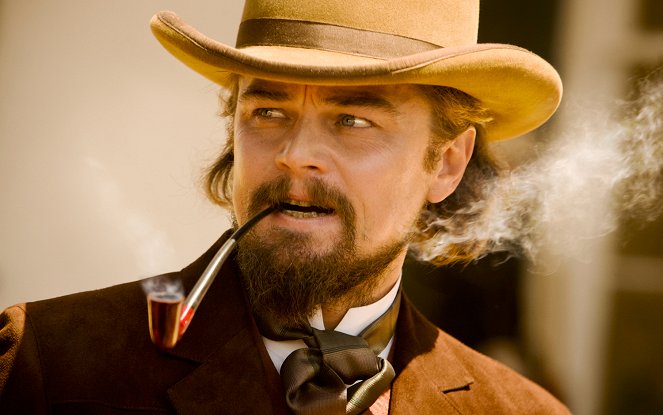Director:
Quentin TarantinoGuión:
Quentin TarantinoCámara:
Robert RichardsonReparto:
Jamie Foxx, Christoph Waltz, Leonardo DiCaprio, Kerry Washington, Samuel L. Jackson, Walton Goggins, Dennis Christopher, James Remar, David Steen (más)Streaming (2)
Sinopsis(1)
Django es un esclavo cuyo brutal pasado con sus antiguos dueños le lleva cara a cara con el cazarrecompensas de origen alemán, el Dr. King Schultz. Schultz le sigue la pista a los hermanos asesinos Brittle y Django es el único que podrá llevarle hasta ellos. El poco ortodoxo Schultz compra a Django con la promesa de dejarlo en libertad tras capturar a los Brittle? Muertos o vivos. Tras la exitosa misión Schultz deja en libertad a Django pero ambos optan por no separarse y seguir el mismo camino. Con la ayuda de Django, Schultz emprende la búsqueda y captura de los delincuentes más buscados del Sur. Según va puliendo sus capacidad como cazador, Django se centra en su única meta: hallar y rescatar a Broomhilda, la esposa que le arrebató el tráfico de esclavos muchos años atrás. La búsqueda de Django y Schultz los guiará en última instancia a Calvin Candie, el propietario de? Candyland? Una infame plantación donde los esclavos son preparados por el entrenador Ace Woody para luchar unos contra otros por diversión. Al reconocer la propiedad bajo pretensiones falsas, Django y Schultz levantan la sospecha de Stephen, el esclavo doméstico de confianza de Candie. Ahora siguen sus pasos, y una despiadada organización se les aproxima. Si Django y Schultz quieren escapar con Broomhilda, se verán obligados a escoger entre la independencia y la solidaridad, el sacrificio y la supervivencia. (Sony Pictures Esp.)
(más)Videos (42)
Reseñas (17)
Solo el final no salió demasiado bien. ¡Qué lástima que Quentin no haya dedicado más tiempo para pensárselo y hacerlo mejor! La escena con el transporte está de sobra y ralentiza la película en el momento en que debe estallar y cerrar todo a la perfección. Si no fuera por esa idea equivocada que me cabe en la cabeza teniendo en cuenta lo perfecto que son los guiones de Quentin, sería la mejor película de Tarantino desde Pulp Fiction. La toma a cámara lenta de las patas del caballo corriendo, la escena ku-klux, la interacción del dúo central con DiCaprio y la tensión de sus escenas, que culminan con la llegada hasta el lugar de Samuel acompañada de los tonos de «Nicaragua» de Goldsmith, ya ahora pertenecen a momentos destacados legendarios (la llegada hacia Samuel es para mí la escena del año - después de cada toma se me pone la piel de gallina). La creación artística de Samuel puede parecer un poco artificial, pero es propiamente icónica e inolvidable. Waltz y DiCaprio son fantásticos, Foxx suficiente. Banda sonora divina. Un pulp de wéstern único con un solo defecto que era fácil de reparar.
()
I didn’t decide to watch this movie for the sole purpose of criticizing Tarantino again. I honestly liked Inglorious Basterds a lot and so I was curious to see what this one would bring. In any case, I knew that style-wise, it was going to be a classic Tarantino that – for a change – uses the best that western’s got to offer. The result was an absolutely unsurprising classic. Tarantino filmed it the best he could. He filmed a piece that respects westerns to the highest degree possible but makes fun of them all at the same time. It respects them with scenes that are a precise copy of some of the best western movie scenes, but it also makes fun of them, for examplewith the fact that the local cowboy is a German and he doesn’t get whiskey in the local saloon; he gets a beer instead. I’ve never seen beer in a western movie before. Also, the Ku Klux Klan scene isn’t one I’m likely to ever forget. And the cherry on top was Jamie Foxx who is an equal of every white man in the movie while the white man simply can’t ever accept that. A classic. Everything comes together to create a great movie, a typical Tarantino piece that isn’t exactly my cup of tea, but that will probablynever change with Tarantino. In any case, I’m glad that I’ve seen the movie and life goes on…
()
Not much of an homage to spaghetti westerns, despite Franco Nero's cameo, rather, some kind of (commendable) anti-racist prod that doesn't even make much sense at the end. The experience resembles a sine wave, as long as Waltz is on screen with his enthusiasm, it's a treat that honours even Western rules. But from the moment we meet DiCaprio, the film goes downhill in quality, where the genre's name would best fit the phrase "typical Tarantino crap" and where the "warrant in your pocket" moment (what a coincidence!) is such a cheap, illogical screenwriting crutch that only a naive viewer can buy it. I could expect anything from Tarantino, but not a cliché like this. And the violence, with hectolitres of squirting ketchup, is so over-stylized (especially in the final carnage) that I'm actually tired of it. PS: The scene with the Ku-Klux-Klan will make anyone laugh, myself included.
()
SPOILERS AHEAD. My second viewing of Django Unchained clarified some seeming structural faults (the triple ending, the ineffectiveness of the romantic storyline), but it still seemed to me that the film has fundamental problems with pacing and cohesion: the continuously changing tone is quite gratuitous, some shots and scenes stick out of the film (the double cameo by Zoe Bell as a woman watching the approaching Django and Schultz from a window and as a gang member). It doesn’t matter that the characters do a lot of talking about things for which a single shot would have sufficed – Tarantino has always been stronger at interior dialogue than narrative images, so we can understand the landscape here as serving a purely decorative purpose. What’s problematic, however, is that some of the dialogue-heavy scenes don’t push the narrative along, nor do they offer any other value added such as slowly built-up tension (which was a major component of Inglourious Basterds). The strangely edited KKK digression after the Brittle brothers are captured (the inserted flashback seems somewhat confusing at first) is nothing more than filler. One storyline concludes, but the next (Hildi) hasn’t yet been opened. The narrative stands still for several minutes. Schultz’s subsequent familiarisation of Django with the rules of the market mechanism initiates the transformation of the slave into a master, which culminates with a radical change of wardrobe. Together with the education in capitalism, however, there is the rather unnecessary (in terms of the narrative, not the viewing experience) training of Django to be the fastest gunslinger in the American south. Despite that, the multi-layered transformation of the protagonist ranks among the best instances of character development in Tarantino’s entire filmography. From the beginning, we are prepared for Django to take over responsibility from his master, toward whom he first behaves like a little boy, eager to learn what has become of his German princess. However, he gradually exhibits more and more independence, though the roles he has to play, which definitely do not suit him, prevent him from fully expressing himself (his microworld has to be subordinated to Schultz’s, with which he later comes into conflict, powerfully for the first time in the scene with the dogs). With all the more bombast in the blaxploitation-style climax, he can take on the position of head moral authority, throw off all masks (and the saddle from his horse) and, as a completely free hard-ass black motherfucker, shoot about two dozen white devils (and one assimilated black man who reveres his master more than his own mother and undergoes a similar shift in meaning in relation to his master as Django does). Finally, Django explicitly sets out to do what Tarantino does behind the camera – break down stereotypes. Most of the characters that the German former dentist and the freed slave encounter correspond to a certain archetype from American mythology or from exploitation cinema (mammy, the Southern belle, the villain obsessed with eugenics). Unfortunately, Hildi is no exception; for Tarantino, she is an unusually one-dimensional female character who is mostly allowed only to cry, scream and be rescued. Django Unchained is an incredibly stylish affair, excellent in many of its constituent parts (soundtrack, actors, punchlines) and bold in its refusal to respect the conventions of westerns (though Italian directors had much earlier violated some of them, e.g. shooting a horse and using white American cowboys as villains), but as a whole, the film is not entirely cohesive. In terms of making an impression, however, it is almost perfect with respect to the intensity of viewing pleasure and I will watch some of its scenes many more times.
()
(menos)
(más)
I was afraid, I don’t like westerns, but I like Tarantino. Fortunately for me, Django Unchained is not even close to a thoroughbred western. It’s just a fun Tarantino movie in the Wild We… South mixed with blaxploitation. After 1200 comments in Filmbooster, it’s hard to come up with something original or interesting to say about Django, so what follows is a couple of personal incoherent rants and observations… The scene with the predecessor of the Ku-Klux-Klan is very funny. The carriage wandering around the American wilderness with a giant model of a tooth on the roof is incredibly cool. Hans Landa can be a nice guy. I wouldn’t like to run into DiCaprio with a hammer. Samuel. L. Jackson is a badass. I liked Inglorious Basterds better :)
()



Anuncio